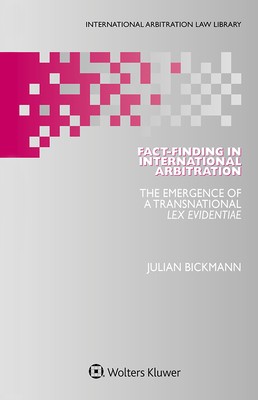
- Išsiųsime per 10–14 d.d.
- Autorius: Julian Bickmann
- Leidėjas: Kluwer Law International
- ISBN-10: 9403518863
- ISBN-13: 9789403518862
- Formatas: 15.6 x 23.4 x 1.4 cm, kieti viršeliai
- Kalba: Anglų
- Extra -15 % nuolaida šiai knygai su kodu: ENG15
Atsiliepimai
Aprašymas
Establishing a factual basis on which to apply the law can be an extraordinarily challenging process, and perhaps more so in international arbitration than in any other proceedings, due to the very different notions of fact-finding that prevail among jurisdictions. This important book assesses, for the first time, the contours of an emerging transnational law of fact-finding that promises to greatly enhance the efficiency and reliability of this crucial arbitral procedure.
In his analysis, focusing on bases that reflect current (but fluid) transnational practice, the author assembles a viable lex evidentiae from an in-depth examination and synthesis of the following bodies of source material:published arbitration proceedings and awards;
the general framework of fact-finding issues as provided for under the arbitration acts of England and Wales, the United States, Germany, Brazil, Spain, Switzerland, Austria, and Italy, as well as under the Model Law;
fact-finding stipulations under UNCITRAL Arbitration Rules as well as under various institutional rules;
soft law (such as the IBA Rules, Prague Rules, ALI/UNIDROIT Principles of Transnational Civil Procedure);
best practices as captured by legal commentary; and
investment arbitration proceedings, where many decisions and awards are nowadays publicly available.
EXTRA 15 % nuolaida su kodu: ENG15
Akcija baigiasi už 10:40:51
Nuolaidos kodas galioja perkant nuo 10 €. Nuolaidos nesumuojamos.

- Autorius: Julian Bickmann
- Leidėjas: Kluwer Law International
- ISBN-10: 9403518863
- ISBN-13: 9789403518862
- Formatas: 15.6 x 23.4 x 1.4 cm, kieti viršeliai
- Kalba: Anglų
Establishing a factual basis on which to apply the law can be an extraordinarily challenging process, and perhaps more so in international arbitration than in any other proceedings, due to the very different notions of fact-finding that prevail among jurisdictions. This important book assesses, for the first time, the contours of an emerging transnational law of fact-finding that promises to greatly enhance the efficiency and reliability of this crucial arbitral procedure.
In his analysis, focusing on bases that reflect current (but fluid) transnational practice, the author assembles a viable lex evidentiae from an in-depth examination and synthesis of the following bodies of source material:published arbitration proceedings and awards;
the general framework of fact-finding issues as provided for under the arbitration acts of England and Wales, the United States, Germany, Brazil, Spain, Switzerland, Austria, and Italy, as well as under the Model Law;
fact-finding stipulations under UNCITRAL Arbitration Rules as well as under various institutional rules;
soft law (such as the IBA Rules, Prague Rules, ALI/UNIDROIT Principles of Transnational Civil Procedure);
best practices as captured by legal commentary; and
investment arbitration proceedings, where many decisions and awards are nowadays publicly available.




Atsiliepimai